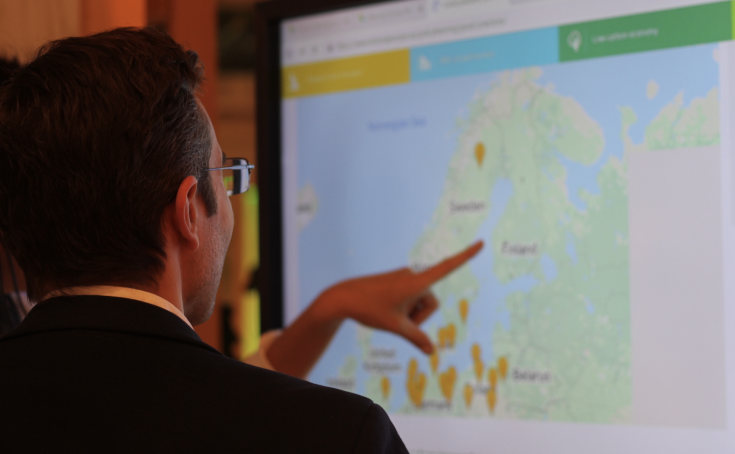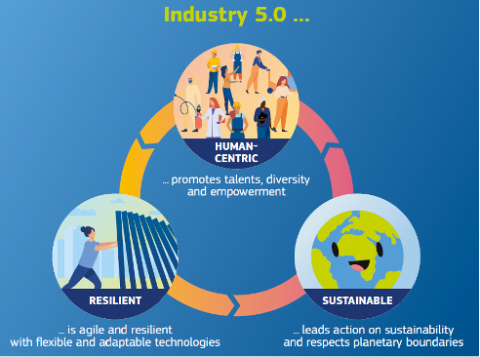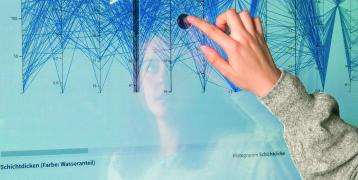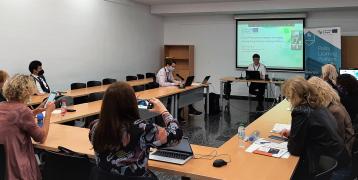Industry 5.0 - A Transformative Vision for Europe

Why a new paradigm for the industrial transformation?
The need for a new industrial paradigm, beyond Industry 4.0, has become more necessary over the years in relation to increasingly complex and pressing economic and societal challenges, such as:
- Climate change and the collapse of biodiversity
- Resource scarcity
- Global shocks such as the COVID-19 pandemic and more recently the war in Ukraine
Those challenges cannot be addressed efficiently by purely industrial approaches. For instance, the current Industry 4.0 standard aims at redefining the industrial sector through the adoption of new digital technologies, new materials, and new processes. It refers to “the use in industrial production of recent and often interconnected, digital technologies that enable new and more efficient processes, and which in some cases yield new goods and services.” (OECD, The Fourth Industrial Revolution).
In the recent policy paper Industry 5.0, a transformative vision for Europe - Governing systemic transformations towards a sustainable industry (EC, January 2022), a group of experts argues that Industry 4.0 is essentially a technology-centred and growth-oriented industrial paradigm. Which lacks adequate consideration of the environmental, societal and sustainable development dimensions of economic activities.
Similarly, building resilience within our existing economy and transforming it to be more resilient to future shocks and stresses, implies that the mitigation of the effects of the pandemics should be more ambitious than aiming for a restoration of the status quo ante. There is a need for new systemic answers.
What is Industry 5.0?
Industry 5.0 tries to provide such an answer and “provides a vison of industry that aims beyond efficiency and productivity as the sole goals and reinforces the role and the contribution of industry to society.” (European Commission). It complements the existing "Industry 4.0" approach by specifically putting research and innovation at the service of the transition to a sustainable, human-centric and resilient European industry.

An industrial system building on the Industry 5.0 paradigm will ideally be:
- Responsible at the value chain and ecosystem level, rather than focused on the optimisation of single businesses
- Regenerative and circular by design, rather than building on the consumption
- Self-sustaining and adaptive, less fragile, rather than dependent on the import of strategic raw materials and energy
- Decentralised, rather than fully globalised, especially – but not only - in the food sector
- Digitalised with purpose, rather than prioritising digital business models accelerating traditional consumption patterns
Although being a new concept, the content of the Industry 5.0 approach is strongly building on and integrating existing European policies such as:
- Adopting a human-centric approach for digital technologies including artificial intelligence (Proposal for AI regulation)
- Up-skilling and re-skilling European workers, particularly digital skills (Skills Agenda and Digital Education Action plan)
- Modern, resource-efficient and sustainable industries and transition to a circular economy (Green Deal)
- A globally competitive and world-leading industry, speeding up investment in research and innovation (Industrial Strategy)
The role of policy makers in Industry 5.0
While Industry 4.0 was primarily a technology-based paradigm, the industrial transformation building the Industry 5.0 paradigm implies the convergence and synchronisation of policies, which are usually under the responsibility of different institutions.
There is consequently also a need for policy makers to adapt their thinking and practice, such as for instance:
- Legal frameworks and regulations need to be adapted to the need for transformation of our economic systems
- Compliance processes need to be better integrated across policy areas
- Public funding schemes should be redesigned accordingly
For all this there is no blueprint available, and, while much has to be done on the global and pan-European level, the concept of Industry 5.0 also offers opportunity for regional actors to develop local transformation strategies combining economic development with revitalisation programmes, as necessary, social support and active labour policies. This is especially the case in relation to the emergence of new decentralised and circular value chains.
The Policy Learning Platform is looking forward to support policy makers in their transformative efforts. Join us on 22 September 2022 from 14:00 to 15:30 CET for a webinar on the topic of 5.0 Industry: From theory to practice. Register here.
Explore further Interreg Europe resources on the topic:


Fostering the digital transformation of SMEs
Discover practical examples of how to foster the digital transformation of SMEs from different perspectives.

The social economy and support to social enterprises
The social economy is a crucial part of the EU socioeconomic landscape. To foster the growth of the EU social economy, policy action is needed. This policy brief aims to spotlight Interreg Europe projects that work to improve their local social economy.

Skills for innovation
Discover five policy recommendations using the experience of Interreg Europe projects dealing with the development of skills for innovation to offer regions a path towards better regional innovation.

Boosting entrepreneurship in rural areas
Boosting entrepreneurship in rural areas opens new opportunities and markets. Rural SMEs show great potential as a source of economic growth and innovation.

Key learnings of financial instruments for the circular economy
Watch the recording and access the key learnings from the webinar on financial instruments for the circular economy that took place on 1 February 2022.

Clusters driving the twin transitions: key learnings
Access the recording and presentations of our online workshop on clusters driving the digital and green transitions that took place on 10 December.

Workshop recording: The future of impact investing
Access the recording and presentations of our hybrid workshop on the future of impact investing that took place on 28 October within the AGORADA+ conference.

